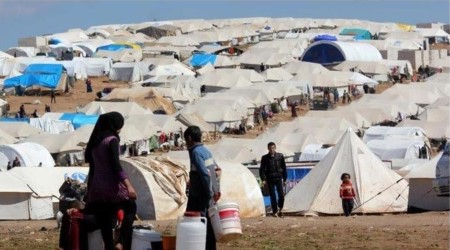Press Release
……………………………………………………….
On Tuesday, 7/5/2024, the Egyptian Coalition for Human Rights and Development issues its report “The Situation of Refugees and Migrants in Egypt and European Countries”, which analytically addresses the living conditions of migrants and refugees in Egypt and some European Countries (France/Spain/Germany/Greece/Turkey/United Kingdom)
The report points out that according to a statistic for the UN Refugee Agency (UNHCR), at the end of June 2023, about (110) million people were forcibly displaced from their homes because of persecution, conflicts, violence, Human Rights Violations, and events that seriously disrupt public order. That represents an increase of (1.6) million people (by more than 1%), compared to (108.2 million people) at the end of (2022). Therefore, one in 73 people is now forcibly displaced worldwide, with the majority –nearly 9 in 10 forcibly displaced- living in low- or middle-income countries.
The Number of Refugees globally reached (36.4) million people in mid-2023, an increase of (1.1 million people) by (3%) compared to the end of (2022). This figure includes (5.9) million refugees under UNRWA’s mandate, (30.5) million refugees and people in refugee-like situations under UNHCR’s mandate. Moreover, another (5.3) million people required International Protection.
In addition, the Protection Officer confirmed that Egypt is a pioneer in dealing with the refugee file, pointing out that the Egyptian State refused to place refugees in camps, since the beginning of the UNHCR in Egypt in (1954). While an official in the UNHCR Media Officer stressed that in cooperation with the Egyptian government, many services are provided, including health and educational services. The officer pointed out that (85%) of refugee children registered with the UNHCR have the right to enroll in schools and get educational services similar to Egyptians, besides health campaigns like obtaining vaccines or the (100) million health campaign.
Moreover, the report emphasized that Egypt has recently received around (40%) of all those fleeing violence in Sudan.
According to a report of the International Organization for Migration (IOM), the current number of international migrants residing in Egypt has reached (9) million refugees from (133) countries, as they benefit on an equal basis with Egyptians, from basic services. In addition, they live in Egypt with an average age of up to (35) years, representing (8.7%) of Egypt’s population, (56%) of them reside in (5) governorates (Cairo/Giza/Alexandria/Dakahlia/Damietta)
Furthermore, the major group of refugees is Sudanese immigrants (4 million), Syrians (1.5 million), Yemenis (1 million), and Libyans (1 million), and these 4 nationalities represent (80%) of the immigrants currently residing in Egypt.
Through data collected with embassies and studies, the organization confirmed that more than 37% of migrants work in steady jobs and stable companies.
The IOM’s report showed that 60% of international migrants living in Egypt (about 5.5 million people) have been well integrated into society for more than 10 years, with 6% living interactively within Egyptian society for 15 years or more, including generations.
The number of refugees in Egypt is equivalent to the number of (3) or (4) European countries, and it puts pressure on the Egyptian economy in terms of the volume of demand for goods and services, in addition to its effects on the Egyptian labor market.
Egypt does not adopt special or domestic laws to deal with migrants, but rather deliberately integrates them into the context of health care and education to varying degrees, and will continue to reject the policy of accommodation camps and refuse to isolate them in any form and under any name.
Furthermore, Egypt granted them freedom of movement within the Egyptian state and provided them with all health and educational services, based on Egypt’s role in dealing with refugees, which prompted them to migrate and asylum.
The report also dealt with the situation of Syrians, Sudanese, Yemenis, Libyans, and Iraqis.
The report also pointed out that some European countries violate the rights of refugees who were forced by circumstances to flee their homelands in search of a shelter, and these violations varied between laws and legislation, tightening legal procedures, and sometimes up to racist and physical attacks.
Asylum and immigration refusals relate to some European countries, most notably: (Britain, France, Germany, Greece, Spain, and Turkey). In addition to the exertion of pressure on the government by some parties and politicians belonging to the extreme right, and then the emergence of a trend among some Europeans rejecting the issue of the flow of migrants and refugees to their countries.
The report praised the great efforts made by the Egyptian citizens and government to welcome refugees despite the difficult economic conditions. It stressed the importance of concerted international efforts to find sustainable solutions to refugee issues through a comprehensive perspective that takes into account the integration between the humanitarian and development dimensions.
The report emphasized the need to mobilize the necessary resources to meet the humanitarian needs of refugees and support host countries based on the principle of equitable sharing of burdens and responsibilities. In addition, the importance of the international community in providing the necessary assistance to the refugees.








